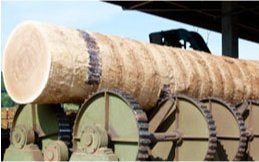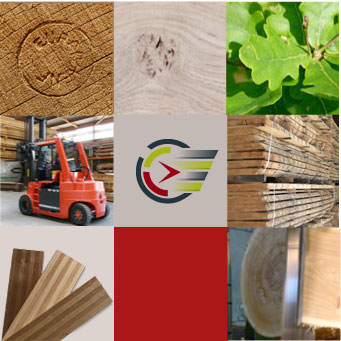Quality
Forest oak and beech logs selected according to the market and country-specific requirements, rapid execution at the sawmill in order to preserve the raw material;
Know-how
- Sawing accuracy owing to a double-cutting band-saw with slabber, a Grecon with laser detection and digitally-controlled optimisation, experienced staff
- Steaming for uniform coloration of planks
- Pre-drying using specific anti-stain sticks
- Vacuum drying technique with high capacity dryer adapted to greater thicknesses in addition to the tried and tested technique of variable ventilation drying
- High accuracy planing and grooving with a good finish owing to a planing machine turning at 8 000 rpm
- Heat treatment in ovens, increasing the natural durability of the wood
KEY FIGURES :
sawmill area
100 000 m2
under cover area
35 000 m2
planks in warehouses
15 000 m3
oak logs under water-sprinkling
5 000 m3


SERVICE : responsiveness of the marketing and production teams, development of new products, adherence to deadlines
STOCK : 15 000 m3 of planks (equivalent to 500 lorries) in warehouses, 5 000 m3 of oak logs preserved by water-sprinkling (equivalent to 200 lorries)
NATIONAL PRODUCTION : wood from French hardwood forests processed in France
TRACEABILITY : computer tracking with barcode from the forest to the final product, PEFC environmental certification
EXPERTISE : capacity to satisfy a non-standard request and activate the supply networks
EXTENSIVE PRODUCT OFFERING : a wide range of species (oak, beech, ash, sycamore maple, cherry, acacia), packaging tailored to various sectors from industrial to artisanal
ENVIRONMENTAL PROTECTION :
- In the manufacturing processes: vegetable oil for cutting tools, exploitation of by-products, electric vehicles.
- Bark recycling: biomass boiler using the bark, avoiding its transportation and the pollution induced, ensuring the heating of the workshops to improve working conditions.
- Raw material management: the residues of boards transformed into chipwood, dried providing renewable energy for communal boilers.







